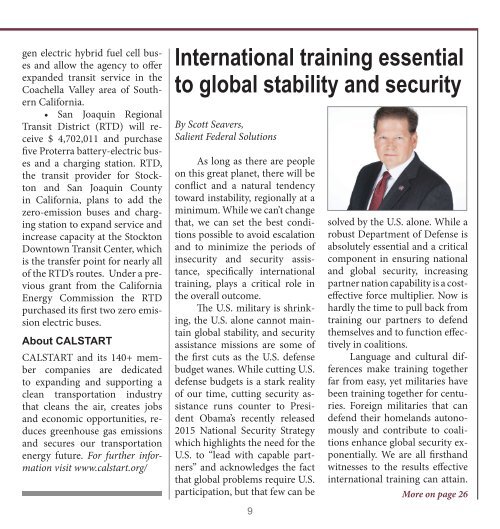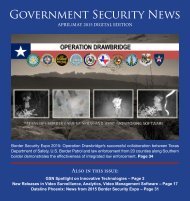Government Security News
You also want an ePaper? Increase the reach of your titles
YUMPU automatically turns print PDFs into web optimized ePapers that Google loves.
gen electric hybrid fuel cell buses<br />
and allow the agency to offer<br />
expanded transit service in the<br />
Coachella Valley area of Southern<br />
California.<br />
• San Joaquin Regional<br />
Transit District (RTD) will receive<br />
$ 4,702,011 and purchase<br />
five Proterra battery-electric buses<br />
and a charging station. RTD,<br />
the transit provider for Stockton<br />
and San Joaquin County<br />
in California, plans to add the<br />
zero-emission buses and charging<br />
station to expand service and<br />
increase capacity at the Stockton<br />
Downtown Transit Center, which<br />
is the transfer point for nearly all<br />
of the RTD’s routes. Under a previous<br />
grant from the California<br />
Energy Commission the RTD<br />
purchased its first two zero emission<br />
electric buses.<br />
About CALSTART<br />
CALSTART and its 140+ member<br />
companies are dedicated<br />
to expanding and supporting a<br />
clean transportation industry<br />
that cleans the air, creates jobs<br />
and economic opportunities, reduces<br />
greenhouse gas emissions<br />
and secures our transportation<br />
energy future. For further information<br />
visit www.calstart.org/<br />
International training essential<br />
to global stability and security<br />
By Scott Seavers,<br />
Salient Federal Solutions<br />
As long as there are people<br />
on this great planet, there will be<br />
conflict and a natural tendency<br />
toward instability, regionally at a<br />
minimum. While we can’t change<br />
that, we can set the best conditions<br />
possible to avoid escalation<br />
and to minimize the periods of<br />
insecurity and security assistance,<br />
specifically international<br />
training, plays a critical role in<br />
the overall outcome.<br />
The U.S. military is shrinking,<br />
the U.S. alone cannot maintain<br />
global stability, and security<br />
assistance missions are some of<br />
the first cuts as the U.S. defense<br />
budget wanes. While cutting U.S.<br />
defense budgets is a stark reality<br />
of our time, cutting security assistance<br />
runs counter to President<br />
Obama’s recently released<br />
2015 National <strong>Security</strong> Strategy<br />
which highlights the need for the<br />
U.S. to “lead with capable partners”<br />
and acknowledges the fact<br />
that global problems require U.S.<br />
participation, but that few can be<br />
9<br />
solved by the U.S. alone. While a<br />
robust Department of Defense is<br />
absolutely essential and a critical<br />
component in ensuring national<br />
and global security, increasing<br />
partner nation capability is a costeffective<br />
force multiplier. Now is<br />
hardly the time to pull back from<br />
training our partners to defend<br />
themselves and to function effectively<br />
in coalitions.<br />
Language and cultural differences<br />
make training together<br />
far from easy, yet militaries have<br />
been training together for centuries.<br />
Foreign militaries that can<br />
defend their homelands autonomously<br />
and contribute to coalitions<br />
enhance global security exponentially.<br />
We are all firsthand<br />
witnesses to the results effective<br />
international training can attain.<br />
More on page 26







